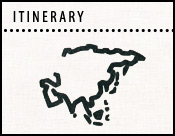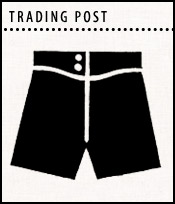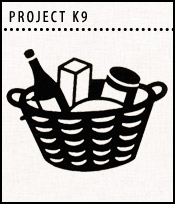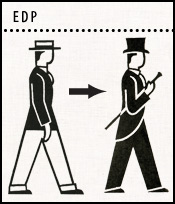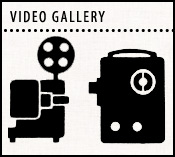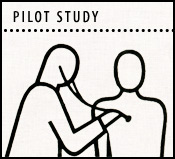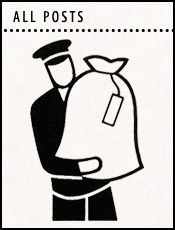October 8th, 2010
I got a fever… and the only prescription is more Red Bull
That next morning, as we woke up amidst the sleeping hordes at Talal’s New Hotel, Claudia was not feeling well. She had managed to pick up a food-born pathogen that Scott and I had somehow escaped. As a result, the team was moving very slowly, hopping from bathroom to bathroom, making our way from the hotel to breakfast, which we decided it would be easiest to execute back at the Le Chef.

Moving so slowly through the city gave us plenty of time to notice and appreciate the strikingly European buildings that were all around us. It was still AsiaWheeling, but there was certainly not a lot of Asia in this place.
Breakfast seemed to do little to help Claudia’s state, and so we returned her to the hotel, where she would spend the day relaxing. Meanwhile, Scott and I headed out to the meeting with Red Bull, with Claudia safe and sound, and hopefully on the mend, in the company of the owner of Talal’s New Hotel. The owner was unfortunately not named Talal. He was, however, a self proclaimed nurse and promised to take good care of our dear West Asia Cultural Liaison.
So with that we hopped on the Speed TRs, just the two of us again, and began wheeling toward a certain Starbucks, a few kilometers down the coast in the less touristy business district of Beirut. Wheeling to the place was certainly raw. We made our way along a very large and busy road. The traffic was fast, and cyclists were very uncommon, which meant that our fellow travelers knew little about what to do when they encountered a cyclist in front of them. At one point on the wheel, Scott caught his long broken dynamo hub-powered light in his spoke, which made a sickening sound and savagely bent the thing. We stopped to tear the broken light off and tighten the spot back up, then hit the road once again. We rode fast, signaling our intent early and often, and eventually we made it to the Starbucks.
Not long after we’d sat down, and well before our sweat soaked shirts had begun to dry, we spotted a laid back, sunglassed character wandering into the shop, making that kind of tentative eye contact that is so common among those who are scanning a room for someone they’ve never met before. It must have been Mueen, our Red Bull contact, and we walked over to make ourselves obvious.
He was indeed Mueen, and he stuck out his hand, and introduced himself. We then sat down and enjoyed the biggest cup of coffee we’d had since we’d arrived from the Gulf. We discussed AsiaWheeling’s philosophy of travel, our adventure to date, and the role that caffeine plays in our lifestyle. You see, dear reader, we ride, day in day out, on some of the gnarliest traffic in the world, literally taking our lives in our hands each day. Preserving our lives requires alertness, vigilance, and lucidity. The number one thing that we can do to encourage that state of mind is to sleep plenty each night, and practice good wheeling technique. But sometimes that just won’t get you there. So thank goodness there’s also caffeine.
We had enjoyed the added lucidity and energy that came along with all the Red Bull we drank while road tripping the Gulf, and we were excited to add it to our lifestyle again.
With the coffees done, we headed around behind the Starbucks, and folded the cycles throwing them into the back of our new friend’s SUV, for the drive over to Red Bull HQ. As we rode, we discussed Lebanon and Lebanese food. “You know of this salad called the fattoush?†he asked. Of course we did, having been eating it nearly daily for a month now. “You see there was a time in Lebanon when there was not much food to go around. We invented this dish as a way to avoid wasting our stale flatbread. The hard, stale bread would be crumbled, blended in with greens, and dressed with oil..†The notion certainly sounded great to us.
Mueen then asked us when we’d last eaten. The answer was, of course, a few hours ago at the Le Chef not far from our hotel. But that seemed enough time to him to be justified in insisting we stop at a restaurant on the way, specializing in a local flatbread called Manakish.
Once there, Mueen ordered us two, and a couple of bottles of Ayran, the local salty yogurt drink.
We finished those as we battled the traffic to get the rest of the way to the headquarters. Inside, we were quickly introduced to the team, all of whom were fantastic people.
We spent a particularly large amount of time chatting with the head of the “sports†division, which in Lebanon, at least, consists largely of motorsports. To give us an illustration, he and Mueen shared a few of their “drifting†videos with us.
For those of you who do not know what drifting is, it’s a motorsport in which the driver exceeds the amount of torque that can be placed on his wheels sending them spinning in smoking, screeching blurs against the ground, and launching his car sliding around a parking lot, drifting like a pat of butter in a hot pan, left and right on burning rubber. Red Bull had sponsored a number of such competitions in Lebanon. And I must admit, the videos were pretty impressive, with the drivers squealing in manic arcs through open lots, around cones, and even through the tight corners of parking garages.
Having finally caught our fill of drifting videos, we headed out to grab some cases of Red Bull and strap them to the bikes.
It felt great to strap so much delightful elixir to our Speed TRs, and we made sure to pause for a group photo before splitting.
And then off we went, back downhill and into town, working our way toward the hotel where we hoped to find Claudia on the mend.
It took us a while to get back, as we battled traffic, laden down with Red Bull, and confused by the lack of signage.
We were forced to stop quite a few times to ascertain our position. Luckily, plenty of the locals spoke bits and pieces of English and all knew where our hotel’s night club district was. So eventually we succeeded in arriving back at Talal’s New Guesthouse to find Claudia looking better, but still far from 100%.
From there, the three of us wheeled to the bus station, which was hidden in an enclave underneath a giant raging highway. In true AsiaWheeling style, we bought the last three tickets on the next bus to Byblos, and commenced sitting around and waiting for our departure time.
I sat down on the side of the platform and played the uke, while Scott chatted with the locals, and Claudia snoozed against a pile of bags, cases of Red Bull, and folding bicycles. In a short while, the bus arrived and we climbed on.
It was a surprisingly short ride to Jbeil, which is the Lebanese name for the city, which surrounds Byblos, and it seemed only seconds later that we climbed off into the night. It was not a touristy bus, evidenced by the fact that we were the only people to get off in Jbeil. With all our bags unloaded and piled nearby, we took a moment to take stock of our surroundings. We were on a street corner, next to the inter-city highway. There were a group of Lebanese army officers nearby us, holding fancy automatic weapons, and scrutinizing our behavior. We openly scrutinized them back, and watched as a few more of them arrived with bags of falafel wraps, handing them out to all the soldiers.
Claudia headed over to ask directions to the center of town, while Scott and I unfolded the cycles. Then we were wheeling again. It was not a big place, and finding our way to the center was quite easy. We checked out a few of the hotels in the city center, but found them all to be well over $100 a night. Even with Claudia sick, we needed some place cheaper, so we wheeled on.
It suddenly became apparent that it was time to eat again, so we pulled over at a shawarma place, and ordered some wraps.
The wraps were delightful and we were even able to plug in our computers and consult the Lonely Planet. The news was not good. It seemed that the entire city was essentially devoid of reasonably priced accommodation. There was one place though, called the King George Inn, which was only $60 a night. This, we decided, would be our next target.
And so with that, we left Claudia to look after our stuff, and continued to compute, while Scott and I headed out on what turned out to be quite the lengthy uphill battle toward the King George.
When we finally arrived, we found the place to be staffed by a very friendly young man, by the name of Tony, and his somewhat curmudgeonly father. The asking prices turned out to be significantly more than what was printed in our perhaps outdated Lonely Planet, but after a fair bit of inspecting of rooms, and heavy bargaining with the son, we were able to arrive upon something that we figured would be manageable for a couple days at least.
We then began haggling over what would be a fair price to have them drive us back down the hill to pick up Claudia and the bags. That too was a tedious affair, but eventually we found common ground.
So we climbed into the father’s shiny black Mercedes, marveling at how Lebanese people all drive such fancy cars, and headed down to pick up Claudia. The man spoke very little English, but was quite fluent in French. So I tried on my old French skills from Grinnell Public High School and began to converse in a most broken way. As we drove on, chatting imprecisely, the father began to renege on all our agreed-upon pricing and started once again inflating the room toward $100. When he found that Claudia was also going to be sleeping there, he redoubled his efforts.
We waited him out, though, and eventually through continued exhausted bargaining and general pricing shtick, we arrived at the same price as before, turned over our passports for registration, and collapsed into bed.


























































































































































































